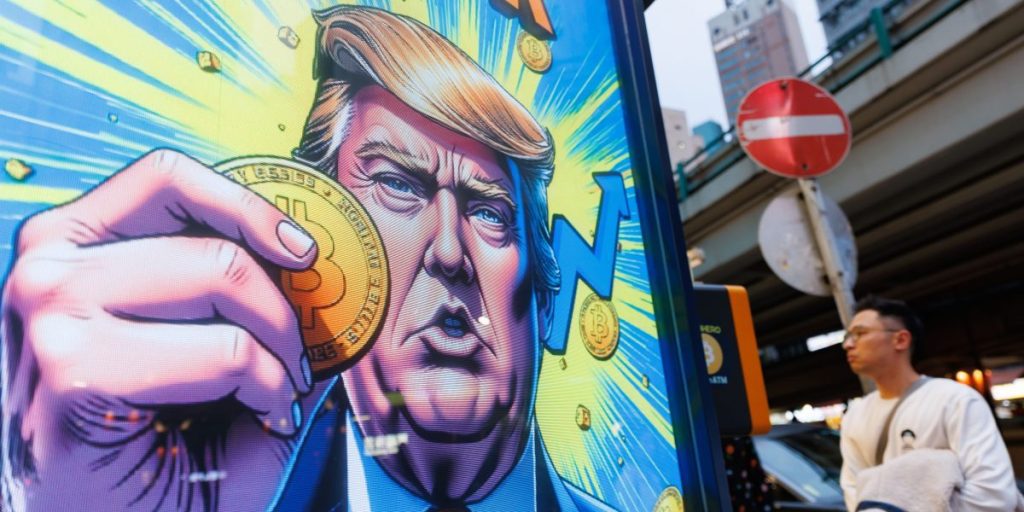Should Donald Trump’s extensive global tariffs cause consumer goods prices to spike and push the economy into recession, one sector might see gains.
The Trump administration is contemplating the use of tariff revenues to purchase Bitcoin, creating a “Strategic Bitcoin Reserve,” according to a senior official in the crypto sector, who shared these insights in a recent interview.
This White House proposal has sparked interest among figures in the cryptocurrency industry, who view establishing the reserve as a major priority.
However, it has also drawn criticism from both conservative and liberal circles, who argue that the reserve amounts to an unnecessary giveaway to the industry at the expense of regular taxpayers. They contend that utilizing tariff funds for this purpose adds further insult.
“This is just a combination of poor ideas,” stated George Selgin, an economist and emeritus professor at the University of Georgia. “The tariffs themselves are misguided, the concept of a Bitcoin Strategic Reserve is flawed, and applying the tariff revenue towards that is an equally bad decision.”
Generating Revenue?
Since Trump first proposed broad tariffs during his campaign last year, he has championed this strategy as a means to bolster domestic industries and augment government revenue.
He has suggested that tariff revenue could potentially replace the nearly $5 trillion generated annually from income taxes, while a senior trade official estimated that it could yield $6 to $7 trillion over the next decade.
Economists across the board consider these figures to be unrealistic. The nonpartisan Tax Policy Center indicated that the massive tariffs—if fully implemented as initially proposed on “Liberation Day”—might generate around $3.3 trillion over that time frame, assuming they don’t trigger an economic downturn.
Despite the modest expected revenues from the tariffs, the Trump administration has been brainstorming various ways to allocate them, ranging from tax reductions for the wealthy to reducing the deficit.
Recently, Bo Hines, director of the Presidential Council of Advisers on Digital Assets, proposed yet another idea. During an interview with investor and crypto personality Anthony Pompliano, he mentioned that the administration might utilize tariff revenues to purchase Bitcoin.
Rationale for Bitcoin?
When Trump declared his intention to create a “strategic reserve” of Bitcoin at a crypto conference last July, it solidified his standing as the preferred presidential candidate among cryptocurrency enthusiasts.
Supporters advocate for Bitcoin as a modern equivalent of gold, touting its significant growth potential. They argue that accumulating Bitcoin could serve as a safeguard against U.S. dollar depreciation and inflation, as they claim.
Shortly after taking office, Trump initiated the reserve but disappointed some in the Bitcoin community by only including tokens seized by the government. Nevertheless, he assured that he would seek “budget-neutral” strategies to acquire more Bitcoin.
According to Hines, using tariff revenues could be one way to build this reserve, but Selgin argues this approach isn’t truly budget-neutral since tariffs essentially function as a tax burden on consumers purchasing imported goods.
The tariffs would disproportionately affect lower-income households. The Budget Lab at Yale University calculated that these tariffs might cost the average household $3,800 annually.
Regardless of funding methods, critics assert that it is inappropriate for the government to invest in an asset like Bitcoin, which lacks fundamental utility and is subject to extreme price fluctuations. Since Trump’s tariff announcement, Bitcoin has already experienced a price decline. If the government were to buy Bitcoin, critics caution that selling any substantial quantity could negatively impact the asset’s market price.
“There are many in the Bitcoin community who would like to see the government take more action, as it would be beneficial for them,” said Selgin, who also holds a position as a senior fellow at the libertarian Cato Institute. “These individuals are seeking to justify something that ultimately serves as a subsidy to them, with little benefit to the broader population.



